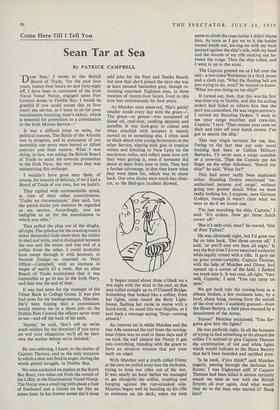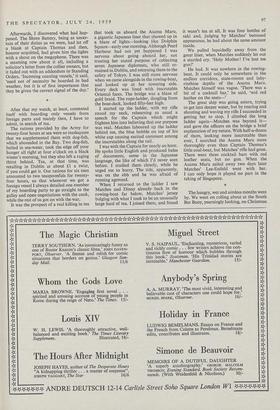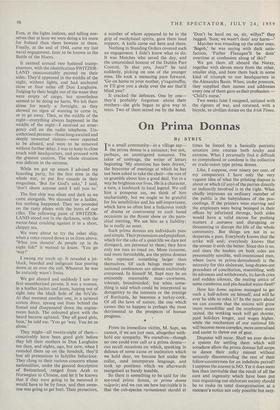Come Here Till I Tell You
Sean Tar at Sea
By PATRICK CAMPBELL
'DEAR SIRS,' I wrote to the British Board of Trade, 'for the past four years, twenty-four hours on and forty-eight off, I have been in command of the Irish Naval Vessel Noray, engaged upon Port Control duties in Dublin Bay. I would be grateful if you could accept this as four years' sea service, as I want to sit for your examination (coasting mate's ticket), which is essential for promotion to a commission in the Irish Marine Service—'
It was a difficult letter to write, for political reasons, The Battle of the Atlantic was in progress, and in pursuance of our neutrality our ports were barred to Allied convoys and their escorts. What I was doing, in fact, was asking the British Board of Trade to assist me towards promotion in the Irish Navy, the very force that was maintaining this embargo.
I wouldn't have gone near them, of course, for reasons of delicacy, if we'd had a Board of Trade of our own, but we hadn't.
They replied with commendable speed, in view of their other commitments. 'Under no circumstances,' they said, 'can the patrol duties you mention be regarded as sea service. Accordingly, you are ineligible to sit for the examination to which you refer.'
That pulled the plug out of the dinghy, all right. The syllabus for the coasting mate's ticket demanded little more than the ability to read and write, and to distinguish between the sun and the moon and one end of a collier from the other. I could probably have swept through it with honours, to become Ensign—as opposed to Petty Officer—Campbell, with an increase in wages of nearly £.5 a week. But an alien Board of Trade maintained that it was impossible to go to sea in the Irish Navy, and that was the end of that.
It was bad news for the manager of the Ulster Bank in College Green. It was also bad news for my leading-seaman, Matches. He'd been hoping that a commission would remove me to a shore job—in the Dublin Port Control the officers never went to sea—and off the back of his neck.
`Jaysus,' he said, 'don't tell us we're stuck widdya for the duration! If you carry on wid your allegations we'll all be blew owa the wather before we're finished.'
He was referring, I knew, to the matter of Captain Thomas, and to the only occasion in which a shot was fired in anger, during the whole global struggle, in Dublin Bay.
We were anchored on station at the South Bar Buoy, two miles out from the mouth of the Liffey, in the Examination Vessel Noray. The Noray was a small tug with about a foot of freeboard and a funnel on her like an ocean liner. In her former career she'd done odd jobs for the Port and Docks Board, but now that she'd joined the navy she was at least painted battleship grey, though re- maining unarmed. Eighteen men, in three watches of twenty-four hours, lived in this iron box continuously for four years.
As Matches once observed, 'She's gettin' smaller inside every day with the grace—'. The grace—or grease—was composed of diesel oil, coal-dust, cooking deposits and paraffin. It was dark-grey in colour and when attacked with scrapers it merely moved on to something else. I often used to think about trim young lieutenants in the other Service, sipping pink gins in tropical whites and listening to Vera Lynn on the wardroom radio, and reflect upon how soft they were getting it, even if someone did shoot at them from time to time. They had a further advantage, in that they knew what they were there for, which was to shoot back. Our own duties were much less clear- cut, as the field-gun incident showed.
It began round about three o'clock on a wet night with the wind in the east, so that seas rolled straight up to O'Connell Bridge. Something that looked like a collier, from her lights, came round the Baily Light- house, flashing her name in morse with a hand-torch. As usual this was illegible, so I sent back a message saying, 'Stop—coming aboard.'
An interval set in while Matches and the two ABs removed the turf from the rowing- boat (there was no coal in those days and if we took the turf aboard the Noray it got into everything, blending with the grace to form an abrasive mixture that put your teeth on edge).
With Matches and a youth called Dinny at the oars we pulled away into the darkness, trying to keep our rifles out of the wet. It was nearly an hour before we managed to get alongside the collier, crashing and banging against the rust-streaked side. Matches began well by handing up his rifle to someone on the deck; when my turn came to climb the rope-ladder I didn't blame him. As soon as I got on to it the ladder turned inside out, leaving me with my back pressed against the ship's side, with my head and the muzzle of my rifle sticking out be- tween the rungs. Then the ship rolled, and I went in up to the waist.
The Captain greeted me as I fell over the rail—a low-sized Welshman in a thick jersey and a cloth cap. 'What the flaming hell are you trying to do, man?' he wanted to know. 'What are you doing on my ship?'
It turned out, then, that this was his first war-time trip to Dublin, and that his sailing orders had failed to inform him that the port was controlled. He was virgin territory. I recited my Standing Orders. 'I want to see your cargo manifest and crew-list, Captain,' I said. 'Then muster your crew on deck and take off your hatch covers. I've got to search the ship.'
This was virgin territory for me, too. Owing to the fact that our only naval training had been at Collins Military Barracks, I'd never seen a cargo manifest or a crew-list. Then the Captain put his finger on the other deficiency. 'Search my ship?' he said. 'What for?'
This had never really been explained either. Standing Orders mentioned 'un- authorised persons and cargo', without going into greater detail. What we were really looking for, I suppose, were German Q-ships, though it wasn't clear what we were to do if we found one.
'I'm just searching the ship, Captain,' I said. 'It's orders. Now get those hatch covers off.'
'But it's only coal, man!' he roared. 'Out of Port Talbot!'
He was obviously right, but I'd gone too far to turn back. 'Get those covers off,' I said, 'or you'll stay out here all night.' It was the first time I'd ever exercised authority while legally armed with a rifle. It gave me no great power-complex. Captain Thomas, with the help of Matches and Dinny, had opened up a corner of the hold. I flashed my torch into it. It was coal, all right. 'Very well, Captain,' I said. 'You can carry on now.'
We got back into the rowing-boat in a silence broken, a few moments later, by a loud, sharp bang, coming from the mouth of the river and—I suddenly guessed—from the Shore Battery, a field piece manned by a detachment of the Army.
'Jaysus!' Matches exclaimed. 'You for- gotta give him the lights!'
He was perfectly right. In all the business of trying to find something to do aboard the collier I'd omitted to give Captain Thomas the combination of red and white lights which would indicate to the Shore Battery that he'd been boarded and certified pure.
'Is he sunk, d'you think?' said Matches eagerly, peering through the darkness for flames. I was frightened stiff. If Captain Thomas had been killed it almost certainly meant we were at war with the British Empire all over again. And what would they do to the man who started it? Hang
him?
Afterwards, I discovered what had hap- pened. The Shore Battery, being as uncer- tain of their duties as we were, had let off a blank at Captain Thomas and then, honour acquitted, had given him the lights with a shout on the megaphone. There was a steaming row about it all, including a solicitor's letter from the collier owners, but it faded out with an addendum to Standing Orders. 'Incoming coasting vessels,' it said, 'need not of necessity be boarded in bad weather, but it is of first importance that they be given the correct signal of the day.'
After that my watch, at least, contented itself with boarding only vessels from foreign parts and mainly then, I have to admit, in search of tea.
The rations provided by the Army for twenty-four hours at sea were so inadequate that we supplemented them with dog-fish, which abounded in the Bay. Two dog-fish, boiled in sea-water, took the edge off your hunger all right at four o'clock on a black winter's morning, but they also left a raging thirst behind. Tea, at that time, was retailing in Dublin at about El a twist, if you could get it. Our rations for six men amounted to two teaspoonfuls for twenty- four hours, so that whenever we got a foreign vessel I always detailed one member of my boarding party to go straight to the galley and open negotiations with the cook, while the rest of us got on with the war.
It was the prospect of a real killing in tea that took us aboard the Asama Maru, a gigantic Japanese liner that showed up in a blaze of lights—looking like Dolphin Square—early one morning. Although Pearl Harbour had not yet happened I was nervous about going aboard her, not trusting her stated purpose of collecting seven Japanese diplomats, who still re- mained in Dublin, and returning them to the safety of Tokyo. I was still more nervous when we came alongside in the rowing-boat, and looked up at her towering side. Every deck was lined with inscrutable Oriental faces. The bridge was a blaze of gold braid. The rope-ladder, dangling from the boat-deck, looked fifty-feet high.
I started up the ladder, with my rifle round my neck, rehearsing as usual a speech for the Captain which might frighten him into believing that our purpose was real. Matches laboured up the ladder behind me, the blue bobble on top of his white cap causing excited comment among the inscrutables along the rail.
I was with the Captain for nearly an hour. He spoke little English and produced bales of documents, some in the Japanese language, the like of which I'd never seen before. I studied them closely, while he urged me to hurry. The tide, apparently, was on the ebb and he was afraid of running aground.
When I returned to the ladder I saw Matches and Dinny already back in the rowing-boat far below, Matches' jersey bulging with what I took to be an unusually large haul of tea. I joined them, and found it wasn't tea at all. It was four bottles of saki and, judging by Matches' bemused appearance, he had about the same amount inside.
We pulled lopsidedly away from the great liner, when Matches suddenly let out a startled cry. 'Holy Mother! I've lost me gun!'
He had. It was nowhere in the rowing- boat. It could only be somewhere in the endless corridors, state-rooms and laby- rinthine depths of the Asama Maru. Matches himself was vague. 'There was a bit of a cocktail bar,' he said, `wid red leather on the seats—' The great ship was going astern, trying to get into deeper water, but by roaring and shouting and waving my rifle I succeeded in getting her to stop. I climbed the long ladder again—Matches was beyond it— and gave the officers on the bridge a brief explanation of my return. With half-a-dozen of them, looking more inscrutable than ever, I searched the Asama Maru more thoroughly even than Captain Thomas's little coal-boat, but Matches' rifle had gone. There were three cocktail bars with red leather seats, but no gun. When the Asama Maru sailed away two days later Matches' Lee-Enfield went with her. I can only hope it played no part in the taking of Singapore.
The hungry, wet and aimless months went by. We went on rolling about at the South Bar Buoy, yearningly looking, on Christmas Eves, at the lights inshore, and telling our- selves that at least we were doing a bit more for Ireland than them bowsies in there. Finally, at the end of 1944, came my last naval engagement, later to be known as the Battle of the Hoors.
It centred around two battered tramp- steamers, with the identification SWITZER- LAND unaccountably painted on their sides. They'd appeared in the middle of the night, without lights, and had anchored three or four miles off Dun Laoghaire. Judging by their height out of the water they were empty of cargo, but nonetheless seemed to be doing no harm. We left them alone for nearly a fortnight, as they showed no signs of wanting to come in, or to go away. Then, in the middle of the night—everything always happened in the middle of the night—I received an emer- gency call on the radio telephone. Un- authorised persons—those long-awaited and deeply unwanted visitors—were reported to be aboard, and were to be removed without further delay. I was to keep in close touch with headquarters, and proceed with the greatest caution. The whole situation was delicate in the extreme.
While we got up steam I advised my boarding party, for the first time in the whole war, to put five rounds in their magazines. 'But for God's sake,' I said, 'don't shoot anyone until I tell you to.'
The first ship was silent and dark as we came alongside. We shouted for a ladder, but nothing happened. Then we pounded on the rusty plates with the butts of our rifles. The yellowing paint of SWITZER- LAND stood out in the darkness, with the motor-boat crashing against it in a short, choppy sea.
We were about to try the other ship, when a voice roared down at us from above. 'What you shoutin' de people up in de night foh?' it wanted to know. 'You go 'way!'
I swung my torch up. It revealed a jet- black, bearded and indignant face peering down at us over the rail. Whatever he was he certainly wasn't Swiss.
We got aboard and suddenly I saw my first unauthorised person. It was a woman, in a leather jacket and jeans, leaping out of sight into the black hole of the fo'c'sle. At that moment another one, in a tattered cotton dress, sprang out from behind the funnel and disappeared down the engine- room hatch. The coloured giant with the beard became agitated. `Dey all good girls, boss,' he told me. 'You go 'way. You let us alone.'
They might—all twenty-eight of them— conceivably have been good girls before they left their mothers in Dun Laoghaire ten days, and nights, ago, but now, when I rounded them up on the foredeck, they'd lost all pretensions to ladylike behaviour. They clung to their various consorts whose nationalities, under the general description of Switzerland, ranged from Arab to Norwegian to Chinese, and let it be known that if they were going to be removed it would have to be by force, and then some- one was going to get hurt. Their protectors, a number of whom appeared to be in the grip of methylated spirits, gave them loud support. A knife came out here and there.
Nothing in Standing Orders covered such an engagement. I didn't know what to do. It was Matches who saved the day, and the untarnished honour of the Dublin Port Control. 'Is that you, Josie?' he said suddenly, picking on one of the younger ones. He took a menacing pace forward. `Go on home to your mother, y'ragamuffin, or I'll give you a skelp over the ear that'll blind you!'
It cracked the defences. One by one— they'd probably forgotten about their mothers—the girls began to give way to tears. Two of them seized me by the hand. 'Don't be hard on us, sir, willya?' they begged. 'Sure, we wasn't doin' any harm—'
Matches was rounding up the other ones. 'Begob,' he was saying with dark satis- faction, 'Father Flanagan'll be doin' overtime at confession along of this!'
We got them all aboard the Noray, together with eleven more from the other, smaller ship, and bore them back in some kind of triumph to our headquarters in the Alexandra Basin. When, under pressure, they supplied their names and addresses every one of them gave as their profession — 'Child's nurse.'
Two weeks later I resigned, satiated with the rigours of war, and returned, with a bicycle, to civilian duties on the Irish Times.








































 Previous page
Previous page